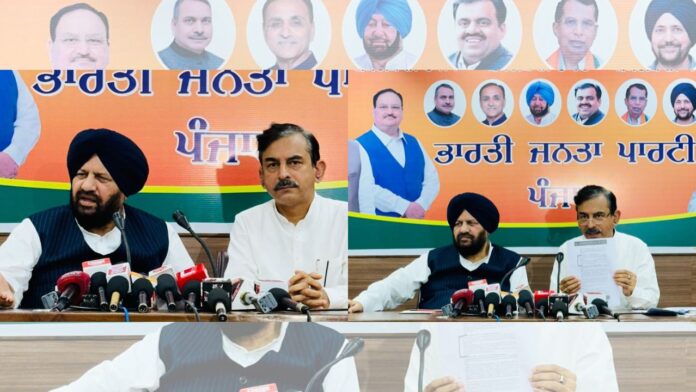AAP government is deliberately stalling paddy procurement in the mandis to retaliate for its crushing defeat in 10 Lok Sabha seats in Punjab: BJP
With a four-month delay caused by the actions of the AAP government and the farmers’ organizations, how can the BJP government at the Centre be held responsible: BJP
CHANDIGARH, 24 October 2024
The Punjab Aam Aadmi Party (AAP) government must immediately purchase paddy from the mandis under Clause 14 of the Punjab Custom Milling Policy 2023-24 to provide relief to the farmers of the state. This demand was made today by senior Punjab BJP leader Sardar Harjit Singh Grewal and state media chief Vineet Joshi at a press conference in Chandigarh.
Grewal and Joshi alleged that the AAP government is deliberately stalling paddy procurement in the mandis to retaliate for its crushing defeat in 10 Lok Sabha seats in Punjab. “If this is not true,” they asked, “why is the AAP government refusing to buy paddy despite receiving ₹43,000 crore from the Centre for its purchase? Why is it not procuring the paddy under single custody?”
The AAP has been falsely claiming that there is no space to store the new paddy due to last year’s rice stock not being lifted. In reality, the paddy stored in open fields last season was processed into rice and moved to closed warehouses, leaving the original storage areas vacant. Additionally, rice mill owners have offered the Punjab government space in their shellers for single custody storage, indicating that storage capacity is available, but the AAP government lacks the will to proceed.
Grewal and Joshi further clarified that the AAP government and certain farmers’ organizations are responsible for the delays in lifting rice from Punjab, not the central government. The Punjab government’s delay in notifying the Fortified Rice Kernels Milling Policy—from the usual 15th of November 2023 to 21st January 2024—resulted in a two-and-a-half-month stall in rice milling. When there is no rice how come the central government will transport .
Moreover, farmers’ organizations contributed to the delay by blocking railway services twice—first in February and later for 40 days during April-May—bringing the train movement to a halt for nearly two months. “With a four-month delay caused by the actions of the AAP government and the farmers’ organizations, how can the BJP government at the Centre be held responsible?” Grewal and Joshi questioned.

 हिंदी
हिंदी






